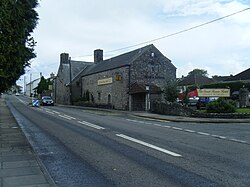Laleston
Laleston
| |
|---|---|
 Great House Hotel, Laleston | |
| Population | 12,586 ( 2011)[1] |
| OS grid reference | SS874796 |
| Community |
|
| Principal area | |
| Preserved county | |
| Country | Wales |
| Sovereign state | United Kingdom |
| Post town | BRIDGEND |
| Postcode district | CF31 4 |
| Dialling code | 01656 |
| Police | South Wales |
| Fire | South Wales |
| Ambulance | Welsh |
| UK Parliament | |
| Senedd Cymru – Welsh Parliament | |
Laleston is a village and a community in Bridgend County Borough, south Wales, directly west of Bridgend town centre. The village takes its name from the Norman Lageles family who settled in the area. Buildings of note in the village include St David's church which still possesses features dating back to the 13th and 14th centuries, the Great House which was built in the early 16th century and Horeb Welsh Presbyterian Church (1831).
As a community, Laleston includes the villages of Bryntirion, Cefn Glas, Tythegston and Broadlands. The boundaries of the community are almost entirely set by transportation routes, with the western and north western border defined by the M4 motorway, where it then turns south-easterly at Stormy Down following the A48 back towards Bridgend town centre. It then takes in the Greenfields area, briefly following the banks of the River Ogmore, before heading north to Cefn Glas, but skirting Bridgend town centre and Newcastle. At the 2001 census, the community's population was 8,475,[2] increasing to 12,586 at the 2011 Census.
Buildings of note
The village of Laleston has several buildings of features of note. Clustered around the church, the village has several cottages and one larger house still recognisable as 16th century design.[3] The Great House (Grade II), now a hotel, has its origins set in the 16th century, though the southern half of the building is more likely an additional 17th century build.
St David's church, which is central to the village, shows 13th and 14th century designs, though much work has been carried out since its earliest period. The church is standard in plan with a west tower, nave and lower chancel, but the tower interior is in the Perpendicular Gothic style. A restoration of 1871 saw all the original windows replaced, and this work was completed by John Prichard, more famous for his restoration of Llandaff Cathedral. There are several rustic tablets in the church from c. 1700.[3] The Church of St David is now a Grade I Listed building, while the churchyard cross is Grade II.[4]
Also of note is Horeb Welsh Presbyterian Church (grade II), of a long-wall facade style with two tall windows in the centre, flanked by two doors, unusual for the 1831 build. While the Laleston Inn (Grade II) on Wind Street is the only building in Glamorgan from this period designed with two serving areas on the lower level.[3]
To the north of Laleston is the field of Cae'rheneglwys, where the remains of the church once dedicated to St Cewydd, who was the Welsh equivalent of St Swithin.[2]
Notable Residents (Past and Present)
- Huw Ceredig (Actor)
- J. J. Williams (Rugby player)
- Christian Williams (Jockey)
- John Raymond (Businessman)
Notes
- ^ "Community population 2011". Retrieved 7 November 2015.
- ^ a b Davies, John; Jenkins, Nigel; Menna, Baines; Lynch, Peredur I., eds. (2008). The Welsh Academy Encyclopaedia of Wales. Cardiff: University of Wales Press. p. 444. ISBN 978-0-7083-1953-6.
- ^ a b c Newman, John (1995). Glamorgan. London: Penguin Group. pp. 369–370. ISBN 0140710566.
- ^ "Buildings of Special Architectural or Historical Interest". Laleston Community Council. Retrieved 14 May 2012.

